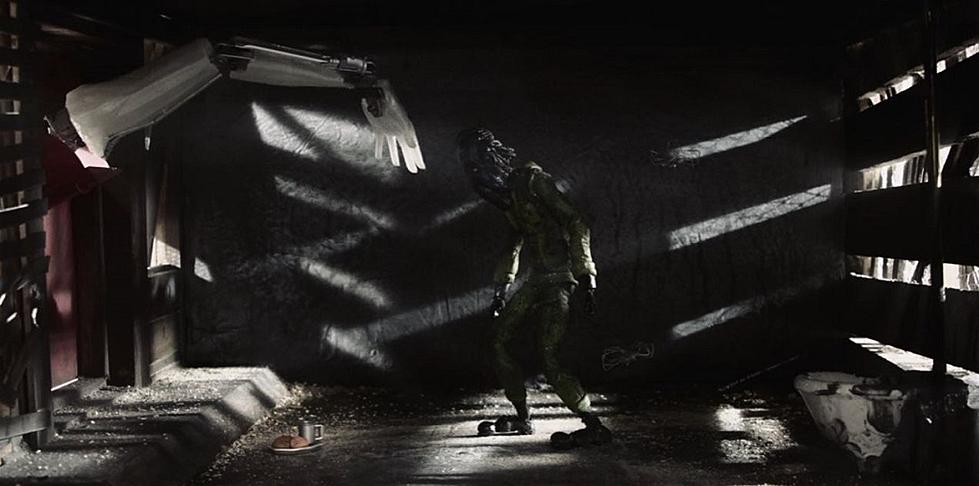
Pondering in the Pit: 17 Essential Post-Hardcore LPs
What the fuck is "post-hardcore" anyway?! Does the term represent the day job you had to get once no one wanted to buy the fanzine you so tirelessly slaved over? Maybe it was the moniker attached to bands whose pits were deliberately more delicate after its members suffered a few too many bloody noses back in the day. Of course, it could stand for what your life resembled after your unpopular hardcore band chose to call it a day shortly after your first demo was destroyed on the message boards.
By all accounts, hardcore began to rub a lot of folks the wrong way at one point or another. The attitude, the lyrical content, the hard-guy posturing, the violence ... Many of its attributes became just too much for some to handle. For others, its format was far too simplistic a means to purge their inner selves. It also just out-and-out scared the bejesus out of many newcomers. Certainly, the genre could have expressed at least a few additional emotions beside anger. Sadly, some simply believed that they were above hardcore.
There were, in fact, a few different generations of what some chose to call post-hardcore: emo, alternative, what have you. Some of the music was very, very good, maintaining much of the aggression of hardcore, while substituting a far broader subject matter and spectrum of sentiments. It wasn't necessarily for the misfit street kids any longer, whose first order of business was to wreak havoc on the dance floor. Admittedly, you kind of looked like a dope flailing away to an impassioned love song as if the lyrics were of no consequence. Even sillier was referring to your own band as “post-hardcore,” as if it were some sort of badge. #confusing.
In the plus column, some fantastic albums came from this — classics even, that rank up there with the very best ever put forth. Here are almost two handfuls of must-haves, but please don’t complain that your favorite has been overlooked. You know what opinions are like …
THE FAITH, SUBJECT TO CHANGE (1983)
Is this where the notion of post-hardcore begins? Subject to Change boasts all of the best elements of D.C. hardcore, but with never-before-heard melodic tidbits, blended with legit hardcore urgency and angst. Naturally, the EP dropped after the Faith called it a day, and this gem is probably still more hardcore than anything else; yet, the Faith’s influence would live on for years to come in many bands eager to become part of this new subgenre.
HÜSKER DÜ, ZEN ARCADE (1984)
Although Hüsker Dü began releasing singles in 1981 during the heyday of early hardcore, it wasn’t until three years later that Bob Mould and co. hit their stride with this intentionally not-so-hardcore concept opus. Dirty, gritty and angry, yet decidedly un-hardcore, it weaves a depressing ongoing tale of facing a treacherous, harsh world throughout. After a couple more strong releases, Hüsker Dü essentially died on the vine after a not-so-smooth transition to a major label.
RITES OF SPRING, RITES OF SPRING (1985)
If you believe everything you read, this Ian MacKaye-produced debut was the launching pad for emo, although Rites of Spring guitarist / vocalist Guy Picciotto has been quoted as proclaiming that notion to be “retarded,” and denies emo as even being a genre of music. Regardless, the energy of this one here is tremendous. Musically, it’s hard without being “hard,” and powerful as all hell. Fantastic live band, too.
NAKED RAYGUN, THROB THROB (1985)
Hailing from the windy city, Naked Raygun were tremendously influential in blending hardcore aggro with hummable melodies — not unlike, say, Bad Religion. However, don’t be fooled by that description. NR’s debut album is as raw and noisy as it is anything else — a clear reflection of their Chicago roots and attitude. And that attitude looms large in Naked Raygun’s quirky, bold lyrical approach: “Napalm makes you vomit / as it sizzles off your weenie!”
BIG BLACK, SONGS ABOUT FUCKING (1987)
Big Black may have just as much in common with the industrial / noise world as they do post-hardcore, but post-hardcore they most definitely still are. Utilizing a drum machine named “Roland” rather than a silly human drummer, Fucking is abrasive as fuck, and lyrically as dark and disturbing as they come. Apparently, Steve Albini found hardcore to be childish. This album is anything but kid stuff!
FUGAZI, 13 SONGS (1989)
This collection is ultimately a combo-platter of Fugazi’s first two EPs, and stands as the unofficial debut full-length from (arguably) THE blueprint when it comes to the sound of latter-day post-hardcore bands. “Waiting Room,” “Bulldog Front”: You know these songs, and are probably aware of Fugazi’s five-dollar gigs, no slamming policy and career sans merchandise. Great tunes, great integrity and tremendous influence.
DRIVE LIKE JEHU, DRIVE LIKE JEHU (1991)
About as strong as a debut album gets, yet probably more influential than it was popular. Drive Like Jehu walked a fine line between listenable and melodic, versus chaotic and loose. A little noise, some sneaky melody, a bit of math-rock — the guitars are massive and in your face thanks to a stellar production job by Donnell Cameron, and it’s not difficult to absorb Drive Like Jehu’s anti-mission coming from the west.
INTO ANOTHER, INTO ANOTHER (1991)
No fans of its members’ previous outfits — Underdog, Bold and Whiplash, to be specific — could possibly have seen this coming. Into Another immediately won the Most Difficult to Define award with this self-titled debut. While it is aggressive and powerful, muscular musicality and intricate melody — along with thoughtfully composed arrangements — make it the winner that it is. Vocalist Richie Birkenhead’s falsetto moments fall somewhere between Freddie Mercury and King Diamond, which automatically sets Into Another apart from any supposed peers.
THE NATION OF ULYSSES, PLAYS PRETTY FOR BABY (1992)
The Nation of Ulysses’ debut wasn’t the most tuneful album ever recorded, and neither is this, their sophomore collection. The unbridled power and recklessness exhibited throughout these 50 or so minutes is astounding. There seemed to be no rules for TNOU, save for ripping through composition after composition with a conviction devoid of given-fucks in regard to conventional arrangements. Not convinced? Peep “Shakedown.”
NEUROSIS, SOULS AT ZERO (1992)
Feel free to refer to Neurosis as “post-metal” or some nonsense like that, but by the early '90s, hardcore had taken on so much metal flavor, the line was truly forever blurred. In Neurosis’ case, what once sounded a lot like U.K.-inspired crust-punk began to slide into slower tempos and sonic experimentation with Souls at Zero. As the BPM count came down, Neurosis became heavier, borderline tribal and infinitely more intriguing. “Atmospheric hell” might be a good description for tracks such as “A Chronology for Survival” or “Flight.”
QUICKSAND, SLIP (1993)
Quicksand are straight-edge hardcore’s entry into the post-hardcore sweepstakes, and Slip is an unadulterated banger! The album seamlessly transports you from where Walter Schreifels had been earlier in the '80s during his bids in Gorilla Biscuits, Youth of Today, etc., and brought you forth into a bright future. The songs are well-crafted, the production is top-notch and the yoots ate it the fuck up. Subsequently, most every late '80s / early '90s hardcore band seemed to morph into some version of Quicksand shortly after Slip hit. C’mon, “Dine Alone”! Banger!
JAWBOX, FOR YOUR OWN SPECIAL SWEETHEART (1994)
Sure, Jawbox jumped to the dreaded major label world for this one after jettisoning the almighty Dischord Records, but FYOSS is probably the premier Jawbox LP in regard to its defined sound and style. Not unlike Quicksand, really, except with far less traditional songwriting structure and a heap more No Wave-style noise-rock tossed in for good measure.
SHUDDER TO THINK, PONY EXPRESS RECORD (1994)
Another major label release from a band previously on Dischord; Shudder to Think may have been at their very best on this, their fifth full-length. Focused, edgy, and inclusive of various sounds and styles, Pony Express Record pissed-off a majority of their fan base; but the non-keepin’-it-real crowd discovered fine tunes like “X-French Tee Shirt,” “Hit Liquor” and “Gang of $.”
AT THE DRIVE-IN, RELATIONSHIP OF COMMAND (2000)
For most heads, these guys seemed to come from out of nowhere, but At the Drive-In’s two previous albums set the tone for this straight-up fuck-you of a long-player, released via the Beastie Boys’ Grand Royal label. It's hard-as-nails, confrontational, anthemic and melodic. Relationship of Command crushes from the first noise of “Arcarsenal” to the abrupt finale of “Non-Zero Possibility.” A laser-focused, near hour-long onslaught of post-hardcore glory!
GLASSJAW, EVERYTHING YOU EVER WANTED TO KNOW ABOUT SILENCE (2000)
Long Island’s Glassjaw remain a bit of an enigma. They were here, and then suddenly they weren’t. At one point, they even discouraged fans from buying this debut album. Regardless, Everything is everything you know about guitar-driven '90s hardcore, but with melodic sensibilities, emotive outpouring and lyrical depth that’s truly special.
CURSIVE, THE UGLY ORGAN (2003)
Plain and simple, Cursive's The Ugly Organ is a masterpiece of an album! It's explosive, musical and intricate all at the same time, squeezing together songcraft and memorable tunes. Whatever subgenre it ultimately belongs to is inconsequential. Just know how good this bad boy is.
THE DILLINGER ESCAPE PLAN, MISS MACHINE (2004)
Call them math-core or just fantastically brutal and genre-bending, but in the early 2000s, the Dillinger Escape Plan were as post-hardcore as they were not. Miss Machine signaled the band’s official emergence as a tornado — one that would feed you LSD and put you on a roller coaster with at least three loops. Along with groups like Brooklyn’s Candiria, the DEP keep you on your toes awaiting the next left turn. The second half of Miss Machine is a mind-fuck of epic proportions.
More From CLRVYNT









